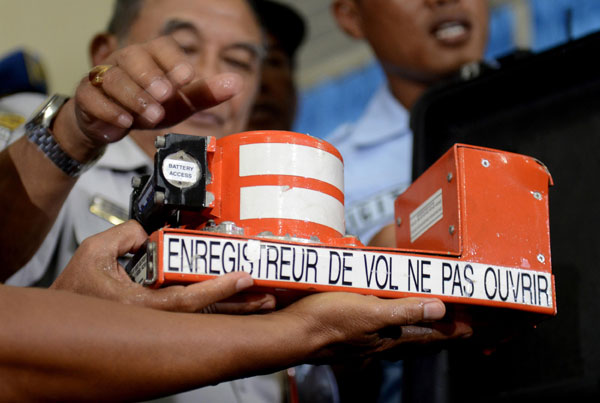Investigators hope to get clues to AirAsia crash in days
(Agencies) Updated: 2015-01-14 14:08
 |
|
Indonesian soldiers the cockpit voice recorder of AirAsia QZ8501 at Iskandar airbase in Pangkalan Bun, Central Kalimantan January 13, 2015.[Photo/Agencies] |
JAKARTA/SURABAYA, Indonesia - Indonesian investigators began examining on Wednesday the black box flight recorders from an AirAsia passenger jet that crashed more than two weeks ago, and hope to unlock initial clues to the cause of the disaster within days.
Divers retrieved the flight data and cockpit voice recorders this week from the sunken wreckage of Flight QZ8501, which lost contact with air traffic control halfway into a two-hour flight from Indonesia's second biggest city Surabaya to Singapore. All 162 people on board were killed.
The recorders were lifted from the bottom of the Java Sea and sent to the capital, Jakarta, for analysis. Both were found to be in relatively good condition.
"In one week, I think we will be getting a reading," Mardjono Siswosuwarno, head investigator for the National Transportation Safety Committee, told Reuters.
The so-called black boxes - which are actually orange - contain a wealth of data that will be crucial for investigators piecing together the sequence of events that led to the Airbus A320-200 plunging into the sea.
The flight data recorder took only 15 minutes to download, but investigators will now need to analyse up to 25 hours of data and several thousand flight parameters coving things such as flying speed, altitude, fuel consumption, air pressure changes and inputs to the aircrafts controls.
"We are feeling relieved but there is still a lot of work ahead of us to analyse it," said Siswosuwarno.
Investigators were expected later on Wednesday to begin downloading data from the cockpit voice recorder, which retains the last two hours of conversations on the flight deck and between the pilots and air traffic controllers.
As is standard procedure, the NTSC will file a preliminary report, which will be made public, to the International Civil Aviation Organization within 30 days. A final report on the crash is not expected to be published for at least a year, Siswosuwarno said.
- AirAsia's final report to be released at least 1 yr later
- Divers retrieve cockpit voice recorder of crashed AirAsia jet
- Divers retrieve AirAsia 'black box', explosion theory questioned
- Investigator disputes AirAsia explosion theory
- Pressure change likely caused AirAsia jet to explode before impact-govt official
- AirAsia cockpit voice recorder located: official
- Black box of crashed AirAsia plane retrieved
 Overhauling China's organ transplant system could take some time
Overhauling China's organ transplant system could take some time
Overhauling China's organ transplant system could take some time





